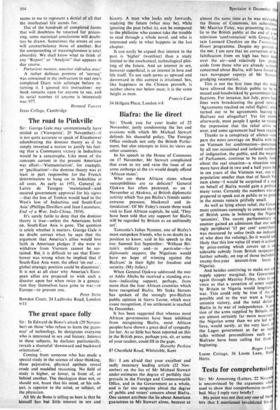Biafra: the lie direct
Sir: Thank you for your leader of 22 November, justly condemning the lies and evasions with which Mr Michael Stewart defends his shameful policy. The Foreign Office misleads not only the British Parlia- ment, but also attempts to foist its views on other countries.
In his speech to the House of Commons on 17 November, Mr Stewart complained that even to try and raise the issue of an arms embargo at the UN would deeply offend `African states'.
Who are these African states whose susceptibilities are so delicate? General Ojukwu has often protested, as on 1 November at Akokwa, at British diplomatic activity which 'has put Biafra's friends under extreme pressure, blackmail and in- timidation'. Of Mr Foley's recent three week visit to East African capitals, he said, 'They have been told that any support for Biafra will be regarded by Britain as an unfriendly act'.
Tanzania's Julius Nyerere, one of Biafra's most outspoken friends, who is no doubt in a position to know, said in his speech to the OAU Summit last September: 'Without Bri- tain's military and—in particular—her diplomatic support, the Nigerians would have no hope of winning against the Biafrans' in their fight for freedom and security. (My italics.) When General Ojukwu addressed the OAU at Addis Ababa he received a standing ova- tion—indicating support, perhaps, from more than the four African countries which have recognised Biafra. Mr Siaka Stevens has spoken of the strongly pro-Biafran public opinion in Sierra Leone, which may cause recognition, if no settlement is reached by December.
It has been suggested that whereas most African governments have been inhibited from recognising Biafra, most African peoples have shown a great deal of sympathy for her. As so little has been reported on this in the British press, perhaps you, sir, or some of your readers, could fill in the gaps.
Dorothy Perkins 87 Chestfield Road, Whitstable, Kent Sir: I am afraid that your excellent and sadly necessary leading article (22 Nov- ember) on the lies of Mr Michael Stewart under-estimates the degree of perfidity that prevails in the Foreign and Commonwealth Office, and in the Government as a whole, and is far too sanguine about the degree of public and voters' concern about Biafra. One cannot attribute the lie about American guarantees to Mr Stewart alone, because at
almost the same time as he was mislead the House of Commons, his subordinat Mr Maurice Foley, was presenting the sa lie to the British public at the end of a B television 'confrontation' with Group Ca tam Leonard Cheshire on the Twenty/, Hours programme. Despite my protests the BBC, I am sure that no correction of th falsification from on high has been ma over the air—and relatively few peop aside from those who are already serious concerned about Biafra, will have found th rare newspaper reports of Mr Stewart grudging recantation.
This is not the first time that the med' have allowed the British public to be be mused and hoodwinked by government fal fications. For instance, last July, press hea lines were broadcasting the good news `Agreements reached on relief flights', wh' turned out to be agreements leaving Biafrans out altogether! Yet for mon afterwards, most people I spoke to retain the impression that the relief crisis a over, and some agreement had been reach Thanks to a conspiracy of silence—co pare the news coverage on Biafra with t on Vietnam for confirmation—punctua by all too occasional and isolated outbur of indignation, the public, and the major of Parliament, continue to be easily foo about the real situation—a situation wh more have died in two and a half years th in ten years of the Vietnam war, out of population smaller than that of South Vi nam alone—I would be surprised if a sta on behalf of Biafra would gain a politic many votes. Certainly the numbers who prepared to speak out in public or to pro in the streets remain pitifully small.
As well as lying about relief, the Gove ment continues cunningly to conceal the r of British arms in bolstering the Nigen 'unionists'. The recent parliamentary counter gained an admission that our se ingly peripheral '15 per cent' contribut was measured by value (with no indica of who does the valuing),So it would likely that this low value (if true) is achie by price-cutting which covers up a siderable subsidy from British taxpayers further subsidy, on top of those included twenty-five-year interest-free loans Nigeria). And besides contriving to make our a supply appear marginal, the Governm again through Maurice Foley, tries to vince us that a cessation of arms suppll by Britain to Nigeria would lengthen war. This could only be true if the possible end to the war were a Niger unionist victory, and the total defeat Biafra in its war of independence. A tion of the arms supplied by Britain, w are almost certainly far more necessary the Nigerian army than we are led to lieve, would surely, at the very least. the Lagos government as far as sta talks without preconditions such as Biafrans have been calling for from beginning. Rogerne, R
Iran Herts. Loom Cottage, 36 Loom






































 Previous page
Previous page